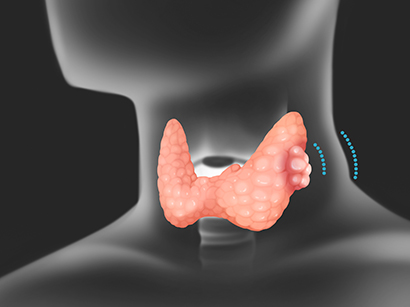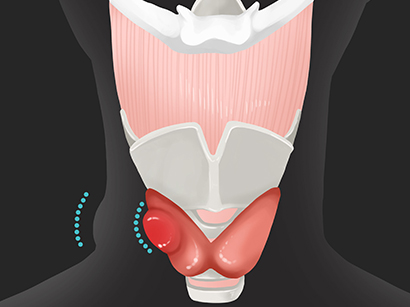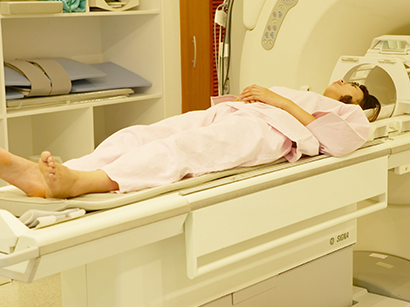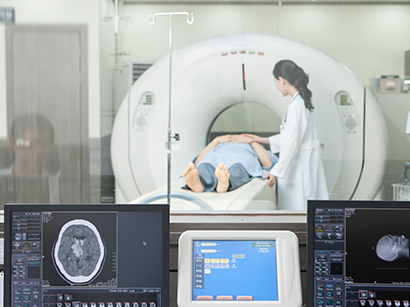Find information on diseases & conditions, and treatment & procedures
Cancer Therapy
Thyroid Cancer
Overview
Thyroid cancer is a mass or masses of cancerous cells formed in thyroid,
a gland located under Adam's apple and produces thyroid hormones
controlling body metabolism. This is the second most frequently treated
cancer among foreign patients in Korea. The cause of thyroid cancer is
not clearly defined yet.


Symptoms
- Typically does not have any symptoms
- Some patients whose their thyroid cancer grown, may experience a change
in the voice, hoarseness, palpable lump, difficulty of swallowing, pain
Treatments
1. Thyroid Cancer Surgery
The majority of thyroid cancer patient undergo cancer removal surgery.
The surgery includes removal of thyroid, lymph nodes around neck,
removing a portion of thyroid (thyroid lobectomy) depending on the stage
of cancer. Some hospitals perform this surgery with endoscopic equipment
and robotic equipment.


1) Process of procedure
- Patients may also receive external radiation therapy along with surgery.
- Begin general anesthesia (patient's breathing will depend on ventilating machine)
- Give a small incision to the area
- All or partial of thyroid is removed
- If patient has cancer spreading lymph nodes, it will be removed under patient's consent
- Suture the incision with delicate care
2) Expected duration of hospital stay
- Generally the procedure itself takes few hours.
- Generally expected hospitalization period is 1~3days including surgery time.
This may differ case by case.
3) Post-operative care
- Patient will be monitored in recovery unit
- The patient will be monitored thoroughly in the recovery unit to ensure that he or
she is free of complications (bleeding, difficulty in breathing, abnormal vital signs).
- Patient may get a drain under the operated area which will be removed within a day.
- Patient may temporally have hoarseness due to irritation caused by ventilation tube
and nerve damage from the surgery.
4) Ideal outcomes
- Cancer tissues are clearly removed.
- Patient's thyroid hormone is under control.
5) Risks
- Bleeding, infection, airway blockage due to bleeding, permanent nerve damage causing
changed voice, hormonal imbalance (low in calcium, increase in phosphorus) caused by
damage of parathyroid glands
6) Treatment cost
- Expected cost ranges from to.
2. Chemotherapy
Usually applied as a supportive treatment to surgery and radiation therapy.
Chemotherapy is delivered via pills and intravenous injection. It significantly decreases
cancer recurrence and metastasis. And it treats recurred or metastasized cancer.


1) Process of procedure
- Chemotherapy is usually given at outpatient clinic if it is an IV injection (more common way),
or taken at home as pills
- Many patients get a vascular access device which enables safe practice of chemotherapy
in their chest.
- Fasting is required on the day of treatment
- Receive medical examination of vital signs
- Receive chemotherapy via IV
- Recheck vital signs
- Consult about side effects with doctor
- Receive prescribed medication and instructions of after chemotherapy
2) Expected duration of treatment
- Generally hospital visiting period is every once a week or once in three weeks
(depending on patient's recovery time)
- Chemotherapy is delivered through three to six months for early stage cancer, and beyond
six months for advanced cancer. It can vary depending on patient's condition
3) Ideal outcomes
- Matastasis of cancer is prevented.
* The size of cancer mass reduces in accordance with the therapy.
4) Risks
- Nausea, fatigue, loss of hair, inhibited production of blood and blood cells from bone marrow,
decreased white blood cells, fever, infection, mouth sores and damage in gastrointestinal tract,
severe pain, and infertility
3. Radiation therapy
Ionized radiations such as X-ray, protons or others are irradiated to remove cancer cells.
It reduces recurrence of cancer after surgery. As it shrinks the size of cancer, is also effective
in relieving symptoms.


1) Process of procedure
- Radiation can be irradiated from outside of body or inside the body while patient is undergoing surgery
2) Expected duration of treatment
- Generally radiation therapy is delivered to patient five times a week for about five to six weeks
(depending on patient's condition)
3) Ideal outcomes
- Metastasis of cancer is prevented.
* The size of cancer mass reduces in accordance with the therapy.
4) Risks
- Fatigue, skin may get irritated, swelling of breast and differed skin sensation may occur.
5) Treatment cost
- Expected cost ranges from to.










 Inquiry
Inquiry Find Doctor
Find Doctor
